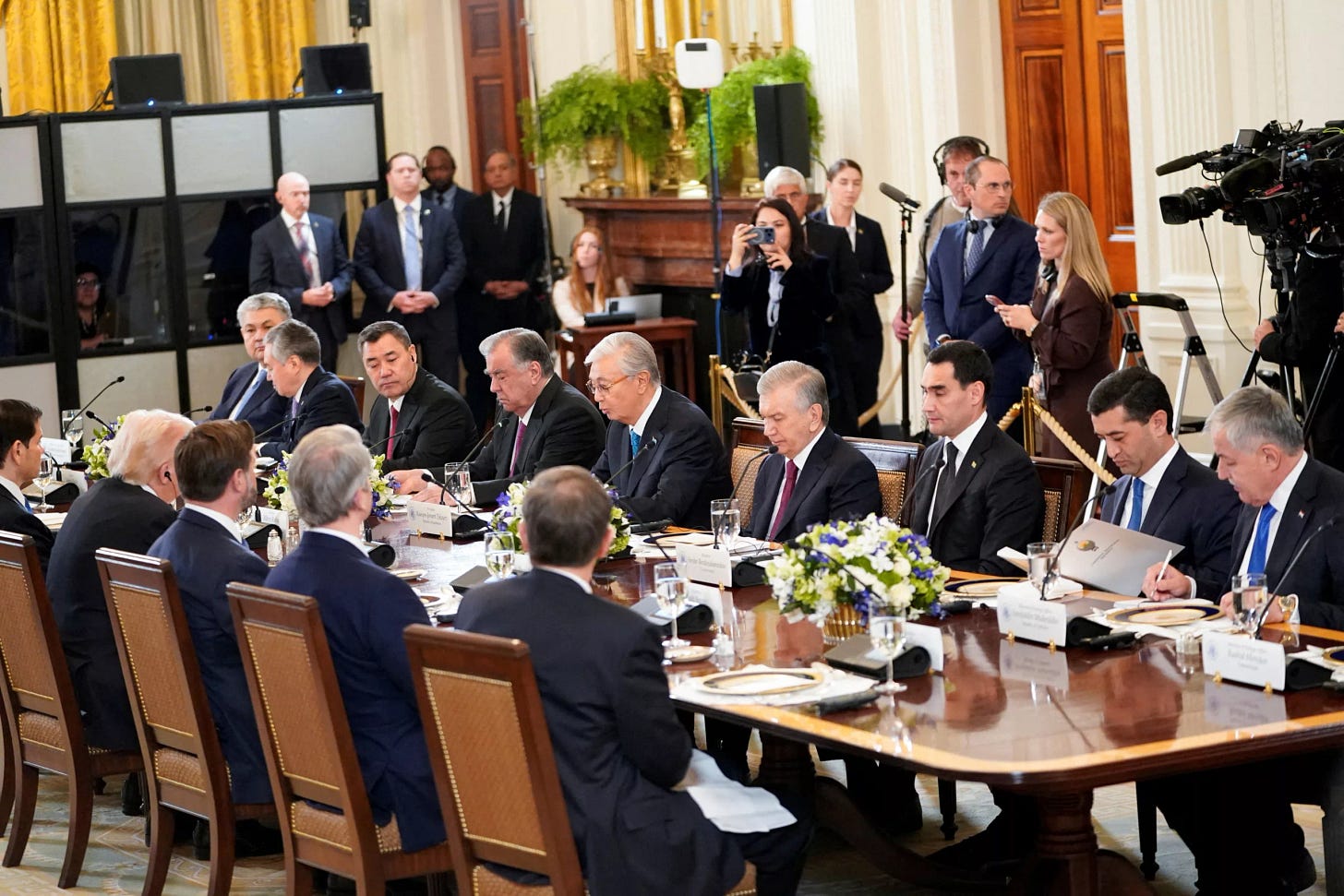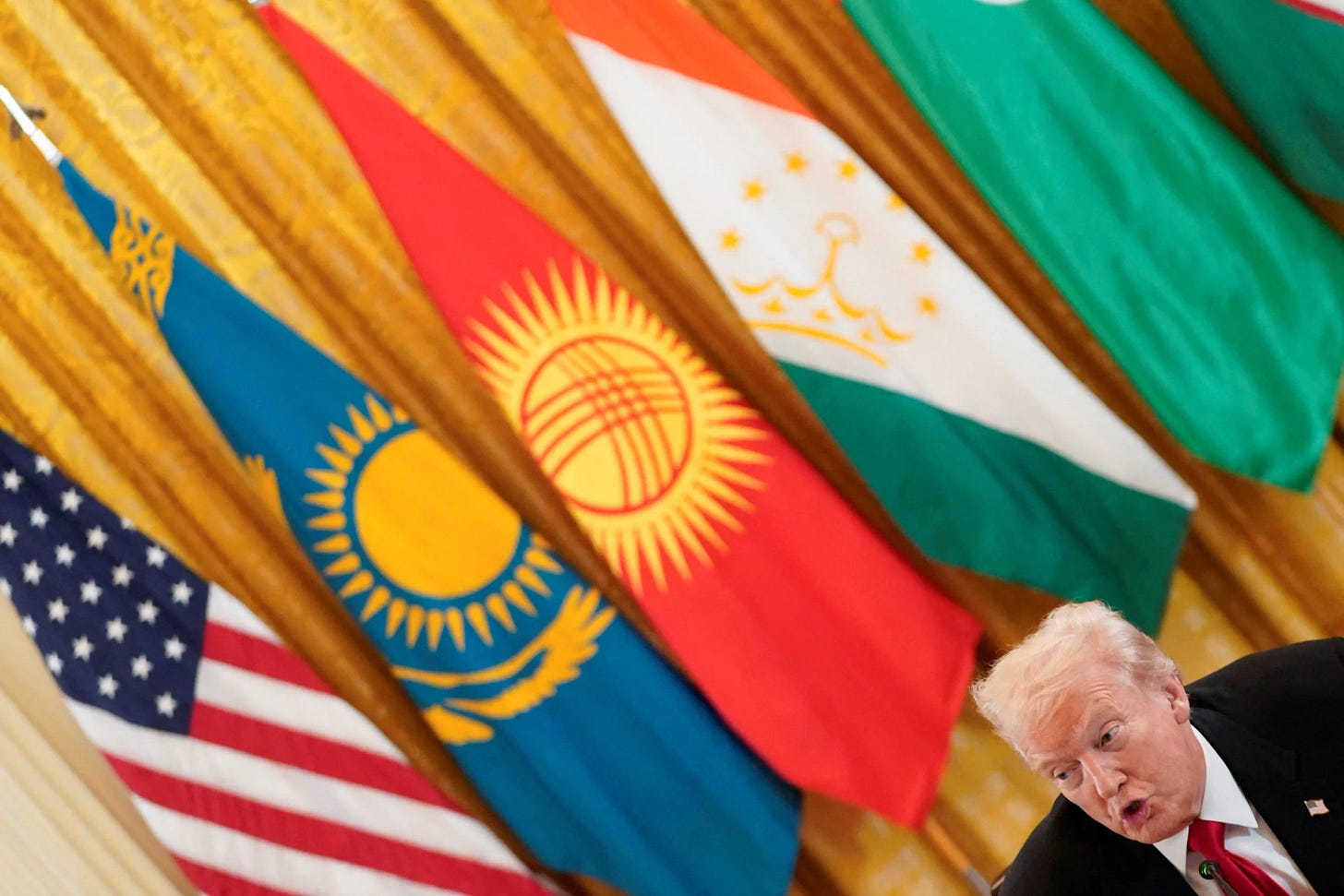As Israel faces one of its deepest ethical, political, and humanitarian crises due to its ongoing war on Gaza marked by mounting global outrage, unprecedented public pressure, and intensifying international isolation another development has raised eyebrows.
Just hours after a domestic political shock in the United States, with progressive Muslim Democrat Zohran Mamdani winning the New York mayoral race, former President Donald Trump announced that Kazakhstan has officially joined the Abraham Accords with Israel.
The announcement came during a formal White House dinner hosting the five Central Asian nations under the “C5+1” framework. Trump revealed he had held trilateral talks with Israeli Prime Minister Benjamin Netanyahu and Kazakh President Kassym-Jomart Tokayev, presenting Kazakhstan’s move as a diplomatic victory for his second term.
While U.S. officials had hinted at the imminent inclusion of a new country, Kazakhstan framed the decision as a natural extension of its balanced foreign policy, focused on dialogue and avoiding conflict.
Indeed, Kazakh-Israeli relations are not new. Since 1992, the two nations have cooperated across various sectors. This move is not a fresh normalization but a formal elevation of longstanding ties. Yet, the timing and symbolism suggest deeper political intent: the real question isn’t what will change but why now, and to whose benefit?
This development transcends bilateral interests and enters a global narrative struggle over the legitimacy of normalization amidst a genocidal war. It reflects a joint U.S.-Israeli attempt to reengineer international alignments in a moment where traditional power dynamics are unraveling, and their ability to impose dominant narratives is rapidly weakening.
A Formal Acknowledgment of a Longstanding Relationship
Kazakhstan’s step cannot be seen as a radical pivot from hostility. Its ties with Israel date back to its 1992 independence from the Soviet Union. The two countries have maintained steady political, economic, and diplomatic relations, with several joint institutions reflecting decades of cooperation.
This formal alignment merely shifts the relationship from quiet diplomacy to open political display.
The economic dimension plays a significant role especially energy. Kazakhstan is a key supplier of Israeli oil, with research estimates showing 10–25% of Israel’s oil imports coming from Kazakhstan. Defense is another facet: a 2014 agreement laid the groundwork for arms deals involving drones, guided missiles, radar systems, and even local production in Kazakh territory.
Cybersecurity has also grown, with Kazakhstan emerging as a key market for Israeli surveillance firms like NSO. Rights groups have documented spyware attacks on Kazakh activists’ phones.
In 2024, trade volume between the two nations reached $236 million, with around 140 Israeli-affiliated companies operating in Kazakhstan. A joint chamber of commerce, established in 2004, has long supported this cooperation.
Thus, Kazakhstan’s move appears more about optics than transformation, but carries symbolic weight in a sensitive geopolitical moment. It feeds into broader regional realignments rather than launching a new bilateral era.
What Do the US and Israel Want From This Move?
Though this step doesn’t create a new reality, its political symbolism opens the door to deeper questions about the motivations behind it especially from Washington and Tel Aviv. Their goals appear to unfold across five primary fronts:
1. Reviving the Abraham Accord Momentum
Four years after their 2020 launch, the Abraham Accords have stalled, especially amid Israel’s Gaza offensive. The inclusion of Kazakhstan injects new life into the agreements, suggesting normalization is still alive even among Muslim-majority states.
Analysts Gershom Sachs and Emily Miliken described this development in The National Interest as “unprecedented,” expanding the accords from the Middle East into Central Asia. Trump’s administration had previously courted Central Asian capitals, seeking to extend U.S.-Israeli influence.
2. Central Asia’s Mineral and Energy Race
The U.S. is locked in a geopolitical-economic rivalry with China and Russia over Central Asia’s critical minerals and strategic trade routes. The Abraham Accords become a vehicle to present Washington as a viable alternative partner.
Coinciding with the announcement were new U.S.-Kazakhstan economic deals on critical minerals and infrastructure investment. Trump also emphasized mineral supply chains, with projects like the “Middle Corridor” granting Israel and the U.S. potential access to the region’s resources.
3. Escaping the Gaza Quagmire
With Netanyahu’s government under fire for war crimes and civilian casualties in Gaza, external “wins” become politically vital. Kazakhstan’s move is cast as a symbolic success, painting Israel as globally accepted even amid widespread condemnation.
4. Trump’s Legacy and Personal Ambitions
Trump’s fixation on branding himself as a global peacemaker looms large. Failing to bring Saudi Arabia into the accords, Kazakhstan becomes his consolation prize—another feather in his diplomatic cap, potentially boosting his Nobel ambitions.
5. Undermining Russian-Chinese Influence
Kazakhstan’s pivot disrupts Moscow and Beijing’s dominance in Central Asia long seen as their strategic backyard. A U.S.-Israeli foothold signals a geopolitical realignment and challenges longstanding power balances.
Moreover, Kazakhstan’s Muslim-majority status adds symbolic heft, hinting that normalization isn’t exclusive to Arab states. This could open the door for broader Muslim-world participation, potentially chipping away at Russian and Chinese influence.
What’s in It for Kazakhstan?
Kazakhstan stands to gain economically and diplomatically. The move deepens its ties with Washington and Tel Aviv and positions it as a regional partner of choice.
By joining the Abraham Accords, Kazakhstan expands its geopolitical options amid the tight squeeze between Russia and China. It now holds a potential leverage card in balancing these powers, while also gaining access to investment, security cooperation, and tech partnerships.
Moreover, embedding cooperation with Israel under the U.S.-backed Abraham framework allows Kazakhstan to present this alliance as development-driven, not ideological a low-risk move given the relative absence of public pressure on the Palestinian cause.
A Quiet Message to Iran
Though not overtly stated, Tehran is clearly in the background. Making Israeli ties public sends a subtle but pointed message to Iran especially given Kazakhstan’s role as the world’s top uranium producer.
A 2009 leak exposed a failed attempt to send uranium to Iran, prompting international concern. Joining the Abraham Accords now seems to decisively shut that door. Trump alluded to this indirectly, noting that regional tensions had prompted Kazakhstan to secure its place among “stability-supporting nations.”
Kazakhstan’s entry into the Abraham Accords does not mark a dramatic policy shift. Its ties with Israel were already entrenched. Yet, the symbolism timed amid the Gaza crisis, regional power rebalancing, and an American presidential campaign carries significant geopolitical weight.
This is less about diplomacy and more about redrawing the strategic map. Normalization now becomes a cross-regional platform, intersecting with global mineral supply chains, power competition, and the recalibration of alliances in a post-Gaza world.
The Abraham Accords have evolved. What started as a Middle East project is now a Central Asian chessboard move with high stakes, deep meaning, and no guarantee of stability.




